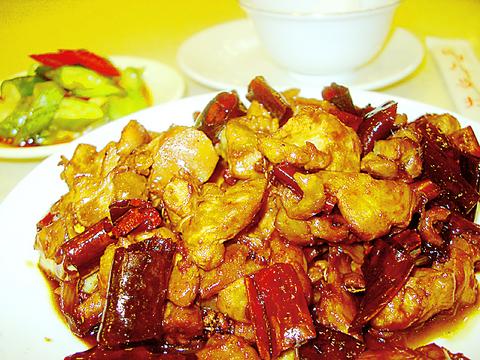For more than half a century, since it moved from Chengdu, Szechuan Province to Taipei, Chili House has been considered the most authentic place for Szechuan cuisine. It is a favorite of Taipei's gourmets and mainlanders who miss their hometown flavor.
It is also known for its very reasonable prices. Frequent guests include politicians John Chang (
You really can't say that you have been to Chili House if you haven't tried their trademark wontons in red chili oil (

PHOTO: YU SEN-LUN, TAIPEI TIMES
In fact, wonton in red oil is such a common snack that it is widely available in night markets. But the way it tastes at Chili House makes the dish stand out and makes Japanese tourists come all the way to taste the NT$55 dish.
Fragrant, spicy and hot are major tastes of Szechuan food. The secret lies in chili, pepper and the unique Szechuan pepper (
For variation, there are wontons in hot and sour oil (
Kung-pao chicken (
Other recommendations include sauteed eggplant with frog in chili sauce (

April 14 to April 20 In March 1947, Sising Katadrepan urged the government to drop the “high mountain people” (高山族) designation for Indigenous Taiwanese and refer to them as “Taiwan people” (台灣族). He considered the term derogatory, arguing that it made them sound like animals. The Taiwan Provincial Government agreed to stop using the term, stating that Indigenous Taiwanese suffered all sorts of discrimination and oppression under the Japanese and were forced to live in the mountains as outsiders to society. Now, under the new regime, they would be seen as equals, thus they should be henceforth

Last week, the the National Immigration Agency (NIA) told the legislature that more than 10,000 naturalized Taiwanese citizens from the People’s Republic of China (PRC) risked having their citizenship revoked if they failed to provide proof that they had renounced their Chinese household registration within the next three months. Renunciation is required under the Act Governing Relations Between the People of the Taiwan Area and the Mainland Area (臺灣地區與大陸地區人民關係條例), as amended in 2004, though it was only a legal requirement after 2000. Prior to that, it had been only an administrative requirement since the Nationality Act (國籍法) was established in

Three big changes have transformed the landscape of Taiwan’s local patronage factions: Increasing Democratic Progressive Party (DPP) involvement, rising new factions and the Chinese Nationalist Party’s (KMT) significantly weakened control. GREEN FACTIONS It is said that “south of the Zhuoshui River (濁水溪), there is no blue-green divide,” meaning that from Yunlin County south there is no difference between KMT and DPP politicians. This is not always true, but there is more than a grain of truth to it. Traditionally, DPP factions are viewed as national entities, with their primary function to secure plum positions in the party and government. This is not unusual

The other day, a friend decided to playfully name our individual roles within the group: planner, emotional support, and so on. I was the fault-finder — or, as she put it, “the grumpy teenager” — who points out problems, but doesn’t suggest alternatives. She was only kidding around, but she struck at an insecurity I have: that I’m unacceptably, intolerably negative. My first instinct is to stress-test ideas for potential flaws. This critical tendency serves me well professionally, and feels true to who I am. If I don’t enjoy a film, for example, I don’t swallow my opinion. But I sometimes worry